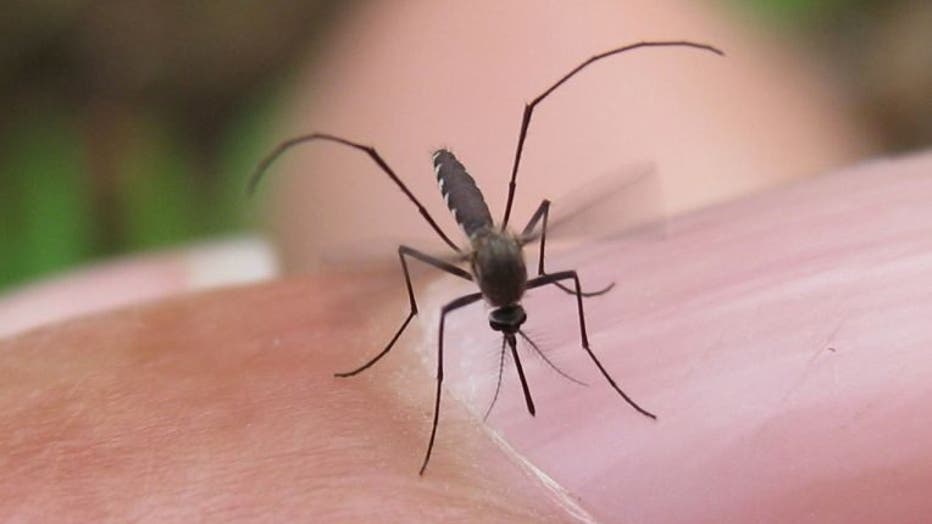Wisconsin West Nile virus; 2 dead, 1 hospitalized in 2024

West Nile Virus in Wisconsin
Dr. Bill Hartman from UW Health joined FOX6 to talk about the recent increase in West Nile Virus cases in Wisconsin, which led to 2 deaths and 1 hospitalization, among other health topics.
MILWAUKEE - The Wisconsin Department of Health Services (DHS) has confirmed two people have died and another was hospitalized in Wisconsin this year because of West Nile virus.
SIGN UP TODAY: Get daily headlines, breaking news emails from FOX6 News
The first three human cases of West Nile Virus in Wisconsin this year have been reported in residents of Outagamie, Fond du Lac, and Brown counties.
In addition, West Nile Virus has also been detected this year in mosquitoes, animals, and healthy blood donors whose blood screened positive for West Nile Virus.
The Department of Health Services say the best way to avoid illnesses spread by mosquitoes is to reduce exposure to mosquitoes and eliminate mosquito breeding sites.

West Nile Virus in Illinois
West Nile Virus has also been confirmed in Lake County, Illinois, which shares a border with Kenosha County, Wisconsin.
The Lake County Health Department and Community Health Center reported the first human cases of neuroinvasive West Nile Virus in Lake County for 2024.
FREE DOWNLOAD: Get breaking news alerts in the FOX6 News app for iOS or Android
In the past seven days, three individuals have tested positive for West Nile Virus, up from just one case reported last year.
One of the affected people, in their 80s, experienced symptom-onset in mid-August and passed away shortly thereafter.
Beware of mosquitoes
Mosquito activity and the risk of infection with West Nile Virus will continue through the rest of summer and into the fall until there is a hard frost (temperature below 28 degrees Fahrenheit for at least four straight hours).
DHS offers these tips to protect yourself and your family against mosquito bites:
- Avoid mosquito bitesApply an insect repellent with DEET, picaridin, oil of lemon eucalyptus, or IR3535 to exposed skin and clothing.Treat clothing with permethrin prior to heading outdoors; do not apply permethrin directly to skin.Consider rescheduling outdoor activities that occur during evening or early morning hours, when mosquitoes that spread WNV are most active.Wear long-sleeves, long pants, and socks when outdoors to help keep mosquitoes away from your skin.
- Apply an insect repellent with DEET, picaridin, oil of lemon eucalyptus, or IR3535 to exposed skin and clothing.
- Treat clothing with permethrin prior to heading outdoors; do not apply permethrin directly to skin.
- Consider rescheduling outdoor activities that occur during evening or early morning hours, when mosquitoes that spread WNV are most active.
- Wear long-sleeves, long pants, and socks when outdoors to help keep mosquitoes away from your skin.
- Mosquito-proof your homePrevent mosquitoes from breeding around your home by removing stagnant water from items around your property.Empty standing water that has collected in tin cans, plastic containers, flower pots, discarded tires, roof gutters, and downspouts.Turn over wheelbarrows, kiddie pools, buckets, and small boats such as canoes and kayaks when not in use.Change the water in bird baths and pet dishes at least every three days.Clean and chlorinate swimming pools, outdoor saunas, and hot tubs; drain water from pool covers.Make sure window and door screens are intact and tightly fitted to prevent mosquitoes from getting into your home.Trim or mow tall grass, weeds, and vines since mosquitoes use these areas to rest during hot daylight hours.
- Prevent mosquitoes from breeding around your home by removing stagnant water from items around your property.
- Empty standing water that has collected in tin cans, plastic containers, flower pots, discarded tires, roof gutters, and downspouts.
- Turn over wheelbarrows, kiddie pools, buckets, and small boats such as canoes and kayaks when not in use.
- Change the water in bird baths and pet dishes at least every three days.
- Clean and chlorinate swimming pools, outdoor saunas, and hot tubs; drain water from pool covers.
- Make sure window and door screens are intact and tightly fitted to prevent mosquitoes from getting into your home.
- Trim or mow tall grass, weeds, and vines since mosquitoes use these areas to rest during hot daylight hours.
Find more information on illnesses spread by mosquitoes and additional ways to Fight the Bite on the DHS website.

